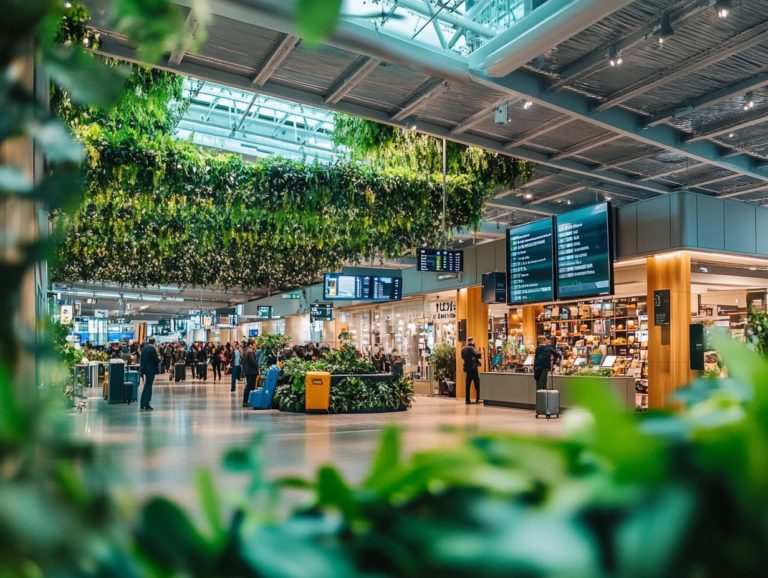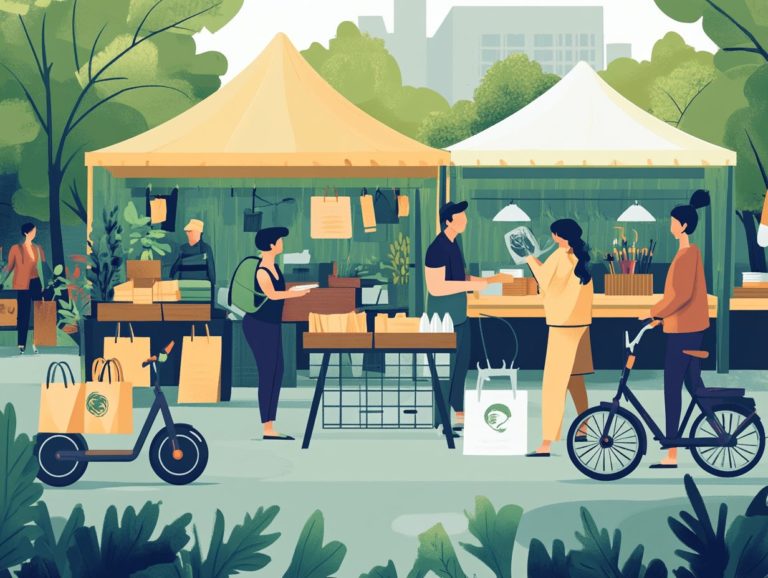10 Tips for Sustainable Road Tripping
Planning a road trip is undeniably thrilling! Have you considered how to make it more sustainable and eco-friendly? Let s dive into some exciting tips to enhance your journey while being kind to the planet.
Here are ten practical tips that will not only improve your adventure but also help you reduce your environmental impact. From selecting the right vehicle to supporting local communities, each piece of advice is crafted to make your trip more eco-friendly.
Whether you re a seasoned traveler or embarking on your very first road trip, these insights will inspire you to start your journey with a sense of responsibility and mindfulness.
Contents
- Key Takeaways:
- 1. Plan Your Route and Stops Ahead of Time
- 2. Choose a Fuel-Efficient Vehicle
- 3. Pack Light and Bring Reusable Bags
- 4. Ready to Make a Positive Change While You Travel? Bring Reusable Water Bottles and Utensils!
- 5. Use Eco-Friendly Toiletries and Cleaning Products
- 6. Opt for Local and Sustainable Accommodations
- 7. Support Local Businesses and Farmers Today!
- 8. Minimize Waste and Properly Dispose of Trash
- 9. Consider Alternative Modes of Transportation
- 10. Offset Your Carbon Footprint
- What Is Sustainable Road Tripping and Why Is It Important?
- Frequently Asked Questions
- What are sustainable road tripping practices that enhance your travel?
- Why is sustainable road tripping important?
- What are some tips for sustainable road tripping?
- How can I support local communities while road tripping sustainably?
- What are some eco-friendly accommodations for sustainable road tripping?
- How can I educate myself about sustainable road tripping?
Key Takeaways:

- Plan ahead to minimize your environmental impact and support local communities.
- Choose a fuel-efficient vehicle and bring reusable items to reduce waste.
- Consider alternative modes of transportation and offset your carbon emissions.
1. Plan Your Route and Stops Ahead of Time
Planning your route and stops ahead is crucial for an eco-friendly road trip. This approach helps you discover sustainable travel options and scenic routes.
By mapping paths that highlight nature’s beauty, you can enjoy picturesque views and connect with local communities. Incorporating scenic byways not only enhances your journey but also allows for meaningful experiences.
For dining and accommodation, select eateries and lodgings that prioritize sustainability. Choosing local establishments not only lessens your environmental impact but also enriches your travel experience.
2. Choose a Fuel-Efficient Vehicle
Choosing a fuel-efficient vehicle, like a hybrid or electric car, is essential for reducing emissions and minimizing your environmental impact.
These vehicles contribute to a cleaner environment and offer financial benefits through lower fuel costs. Models like the Tesla Model 3 and Volvo XC40 Recharge showcase how technology can enhance sustainability.
By opting for electric power, you drive without tailpipe emissions, which positively impacts air quality.
3. Pack Light and Bring Reusable Bags
Packing light and using reusable bags are essential eco-friendly practices. They significantly reduce waste and improve your sustainable travel experience.
When you cut down on luggage, you also boost fuel efficiency, leading to a smaller environmental footprint.
Choosing reusable bags over single-use plastic plays a crucial role in waste reduction. It conserves resources while decreasing landfill contributions.
If you aim to travel mindfully, consider versatile clothing options or multi-functional travel gear. These choices promote a mindset of conscious consumerism.
Implementing these packing techniques streamlines your journey and helps cultivate sustainable habits in your daily life.
Start your adventure today! Share your experiences or tips for sustainable road trips with others.
4. Ready to Make a Positive Change While You Travel? Bring Reusable Water Bottles and Utensils!
Bringing reusable water bottles and utensils is a crucial step in minimizing waste while you travel. It promotes sustainable habits that benefit both you and the environment.
By consciously opting for reusable items, you can significantly reduce the reliance on single-use plastics that pile up in landfills and oceans. This practice conserves valuable resources like water and energy, while also lowering the carbon footprint linked to the manufacturing of disposable products.
When choosing high-quality reusable items, seek options crafted from durable materials like stainless steel or plastics that do not contain harmful chemicals. These selections enhance longevity and ensure they can endure the demands of your travels.
Incorporating these eco-friendly alternatives into your journey reflects your commitment to sustainability and inspires those around you to embrace responsible behaviors, collectively making a meaningful impact on the preservation of our planet’s precious resources.
5. Use Eco-Friendly Toiletries and Cleaning Products
Using eco-friendly toiletries and cleaning products does more than elevate your travel experience; it actively supports sustainable travel, conserves water, and reduces harmful chemicals that threaten our ecosystems.
These choices significantly reduce pollution and play a vital role in protecting our planet s delicate balance. By opting for biodegradable products free from toxic substances, you help preserve local wildlife habitats and reduce your carbon footprint.
This approach supports a healthier environment, not only for the present generation but for those yet to come. As you incorporate eco-friendly options into your travels, you join a broader movement that champions sustainability, inspiring others to follow your lead and collectively make a positive impact on nature and wildlife conservation.
6. Opt for Local and Sustainable Accommodations

Opting for local and sustainable accommodations, like eco hotels or lodges that champion responsible tourism, is essential for traveling sustainably and uplifting local communities.
By selecting these types of lodgings, you minimize your carbon footprint and actively contribute to the preservation of our precious natural resources. Many eco-friendly hotels are equipped with energy-efficient systems, such as solar panels and rainwater harvesting, to lessen their environmental impact. For instance, a renowned lodge might employ bamboo for construction and serve organic meals sourced from nearby farms, thereby reinforcing local agriculture.
These accommodations often engage in community projects, supporting local artisans and sponsoring conservation initiatives. This immersive approach adds richness to your travel experience and fosters a deeper connection between you and the destinations you explore.
7. Support Local Businesses and Farmers Today!
Supporting local businesses and farmers during your travels elevates your experience and cultivates community engagement while championing responsible tourism.
By sourcing local produce and products, you actively contribute to the well-being of the areas you visit, leaving a meaningful mark on the local economy. This connection helps preserve cultural heritage and ensures that artisans and farmers can continue their invaluable trades.
Here are some great places to start:
- Farmers’ markets
- Craft fairs
- Shops showcasing handmade products
Engaging with the owners about their stories or production methods can lead to unique insights and memorable interactions, ensuring your journey is both fulfilling and sustainable.
8. Minimize Waste and Properly Dispose of Trash
Minimizing waste and properly disposing of trash are essential for responsible travel. Ensure your eco-friendly road trip leaves a positive mark on the environment and local communities.
Embrace practical strategies like recycling and composting to reduce your footprint and champion a culture of sustainability. As you plan your route, consider incorporating best practices for sustainable road trips by identifying locations with recycling facilities or community composting programs. This makes waste management a seamless part of your journey.
Recognizing that reducing pollution directly impacts wildlife conservation and the overall health of ecosystems is vital. Cleaner environments foster thriving habitats for diverse species, creating a balance in nature that benefits all forms of life. Adopt these sustainable practices and help preserve our planet!
9. Consider Alternative Modes of Transportation
Explore alternative modes of transportation like biking, walking, or taking public transit to elevate your eco-friendly road trip while reducing carbon emissions.
Sustainable travel options cut greenhouse gases and encourage water-saving practices. They also promote healthier lifestyles while supporting local communities that benefit from responsible tourism. For those interested in exploring nature responsibly, consider traveling off-grid: eco-conscious adventure tips. Staying active helps you connect more deeply with your surroundings.
In urban areas, public transit systems streamline travel, alleviate traffic congestion, and improve air quality. In rural settings, biking or walking invites you to appreciate the natural environment and engage with local artisans creating unique crafts and artworks, transforming your journey into a more mindful experience.
Choosing these options plays a vital role in responsible tourism practices and conservation efforts. Your actions ensure that future generations can revel in the beauty of nature while maintaining its integrity.
10. Offset Your Carbon Footprint
Offsetting your carbon footprint is essential for any eco-conscious traveler. This practice helps counterbalance your environmental impact through smart choices and sustainable initiatives.
Engage in various ways to balance your carbon emissions that prioritize wildlife conservation. For example, when you invest in renewable energy from local producers, such as solar and wind power, you support the transition to cleaner energy while boosting local economies and creating jobs.
Contributing to wildlife conservation efforts helps protect biodiversity and preserve habitats. This ensures that future generations can enjoy the beauty of nature.
Every action counts! Every offset you initiate, no matter how small, reflects a collective commitment to sustainable travel. Your individual actions can make a significant difference. Join the movement for a cleaner planet today!
What Is Sustainable Road Tripping and Why Is It Important?
Sustainable road tripping is your ticket to a mindful travel experience that incorporates eco-friendly road trips that prioritize reducing your environmental impact while exploring new destinations.
It emphasizes eco-friendly and responsible practices that align with your values. This approach encourages you to thoughtfully consider your choices, from selecting fuel-efficient vehicles, such as hybrids and electric vehicles to opting for accommodations that harness renewable energy.
Embracing these principles helps you reduce your carbon footprint. It shows your commitment to the planet s well-being.
The importance of this initiative cannot be overstated; it not only promotes environmental preservation but also nurtures an awareness of local ecosystems and communities.
As you embark on these journeys, you ll find satisfaction in knowing that your travels contribute to a more sustainable future enabled by community engagement, ensuring the beauty of nature remains intact for generations to come.
How Can You Plan a Sustainable Road Trip?

Planning a sustainable road trip means weaving eco-friendly practices into your journey, starting from route selection that emphasizes scenic routes and efficient travel to your choice of accommodations. This approach not only elevates your travel experience but also aligns with a greater purpose.
Begin by researching destinations renowned for their commitment to sustainability. This not only helps you minimize your carbon footprint but also invites you to explore areas that prioritize environmental preservation. Consider following top sustainable travel practices to enhance your eco-friendly journey.
Making a flexible travel plan allows you to adapt your plans on the fly. This opens up spontaneous opportunities for detours to organic orchards or local markets where you can find local produce and handmade goods that reflect the region’s cultural heritage or local parks or organic farms.
Engaging with local communities can lead to authentic experiences that deepen your understanding of the culture while supporting sustainable dining practices and environment, all while supporting local economies.
By weaving these thoughtful steps into your travel plans, you’ll make sure your adventures contribute to a more sustainable future.
What Are the Benefits of Choosing a Fuel-Efficient Vehicle?
Choosing a fuel-efficient vehicle opens the door to a multitude of benefits, including reduced emissions, enhanced fuel efficiency, and a smaller carbon footprint. For eco-conscious travelers like you, it’s a savvy choice.
These vehicles typically excel in terms of maintenance costs, easing the financial burden over time. When you compare conventional gasoline-powered cars to hybrids or electric vehicles, you ll find that the latter not only consume less fuel but also harness sustainable energy sources.
This means you can maximize your cost savings while minimizing your environmental impact. As you explore your options, selecting a fuel-efficient model aligns seamlessly with your commitment to a sustainable travel experience.
This choice contributes to cleaner air due to reduced emissions from eco-friendly vehicles. Ultimately, you ll enjoy a healthier planet for generations to come.
How Can You Reduce Waste While on a Road Trip?
Reducing waste on your road trip is entirely possible with some mindful practices. Consider using reusable products that help minimize waste by choosing bulk options, minimizing packaging, and managing trash disposal strategies that align with sustainable habits.
You have the power to greatly reduce your environmental footprint! Opt for reusable water bottles, cloth bags, and food containers. Packing snacks in bulk instead of single servings not only cuts down on plastic waste but also saves you money.
It’s important to devise a waste management plan that incorporates recycling. This plan includes recycling whenever possible and identifying suitable disposal sites for non-recyclables. Every small effort you make contributes to combating pollution through responsible travel and preserving ecological health supported by local conservation efforts. Additionally, you can learn how to make your next trip more eco-friendly to enhance your positive impact.
Recognizing how supporting local businesses can make a difference can inspire you to embrace more sustainable habits during your travels. By minimizing waste while on the road, you’re playing a part in creating a cleaner planet. For tips on how to make the most of your journey, check out our guide on how to plan a sustainable travel itinerary. Join the movement for sustainable travel today!
What Are the Best Ways to Support Local Communities While Traveling?
Supporting local communities during your travels can be a rewarding experience. There are numerous ways to do it, such as patronizing local businesses while traveling responsibly and participating in community events that celebrate local culture.
When you shop at local markets, you not only enjoy fresh produce and handmade goods, but you also immerse yourself in the area’s unique culture and flavors. Dining at farm-to-table restaurants enhances your culinary journey while reinforcing connections between local farmers and the community.
These engagements create a win-win scenario for both travelers and local communities. You gain a richer understanding of your destination, while residents enjoy economic benefits, fostering pride and unity within the community. Act now to support local while you travel!
What Are Some Sustainable Alternatives to Traditional Road Trips?
Sustainable alternatives to traditional road trips include utilizing public transport that reduces the overall carbon footprint, eco-friendly vehicle rentals, or engaging in bike tours that promote fitness and eco-tourism. Each option offers unique opportunities for responsible travel.
These choices reduce your carbon footprint and lead to less crowded roads and cleaner air. For instance, opting for a train journey as a sustainable travel option allows you to relish scenic views while minimizing emissions, creating a more relaxed and immersive experience. Additionally, consider planning eco-conscious road trips for a fun and responsible adventure.
Bike tours promote your physical well-being while engaging in outdoor adventures. They also foster a tangible connection to your surroundings, encouraging a slower pace that enhances your appreciation for local culture and nature.
By choosing these eco-friendly travel methods, you make thoughtful decisions that pave the way for a sustainable tourism future that benefits all involved. This benefits both the planet and the communities you visit. Join the movement for sustainable travel today!
Frequently Asked Questions
What are sustainable road tripping practices that enhance your travel?

Sustainable road tripping is a way of traveling that minimizes negative impacts on the environment and local communities while promoting responsible and ethical tourism practices.
Why is sustainable road tripping important?
Sustainable road tripping is important because it helps to preserve the environment and local communities for future generations while also promoting responsible and ethical tourism practices.
What are some tips for sustainable road tripping?
- Plan your route to minimize driving time and distance.
- Pack reusable water bottles and containers to reduce waste.
- Choose eco-friendly accommodations and support local businesses.
- Reduce the amount of carbon dioxide your travel produces by carpooling or using public transportation.
- Dispose of waste properly and avoid littering.
- Stick to designated trails and campsites to protect natural habitats.
How can I support local communities while road tripping sustainably?
Support local businesses and buy products made in the area. This not only benefits the community but also reduces your travel s impact on the environment.
Get involved by volunteering for local conservation projects! It’s a rewarding way to give back.
What are some eco-friendly accommodations for sustainable road tripping?
Look for green hotels, campgrounds with sustainable practices, and eco-lodges.
Staying with local families through homestay programs is also a great option.
How can I educate myself about sustainable road tripping?
Many online resources can help you learn about sustainable road tripping, including blogs, articles, and guidebooks.
Consider joining eco-tours or workshops to discover sustainable practices while on the road!






